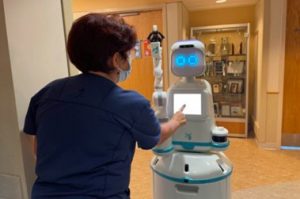‘I’m mesmerized’: Moxi the ‘cobot’ makes the rounds at Delaware hospital
 Nurse Tina Merritt approaches her new assistant with heart-shaped eyes in Christiana Hospital’s cardiac unit.
Nurse Tina Merritt approaches her new assistant with heart-shaped eyes in Christiana Hospital’s cardiac unit.
Merritt leans in close.
“Hi Moxi,” she says in a cheery greeting. “Do you have a delivery for me?”
“Meep.”
That chirpy sound is one way that Moxi the 300-pound “cobot” — short for collaborative robot — communicates with staffers at Delaware’s biggest hospital. The Newark facility is one of a handful of hospitals across the country that have started using cobots to deliver medications and other supplies to nurses.
Merritt opens one of the cabinets built into Moxi’s frame.
“When Moxi comes to deliver something, we just get our badge, and the drawers will open to whatever drawer she had things hidden in,” Merritt said.
Equipped with artificial intelligence, Moxi knows what to bring or pick up because nurses use the touchpad screen on the cobot’s chest to send it somewhere or place an order. It could retrieve pills from the pharmacy for a patient, take samples to the lab, or grab towels, bandages, PPE, or any other supplies the unit needs.
Two Moxis started working at Christiana in February. They are currently mapping the floors to learn their way around, so they can operate autonomously. They have a robotic arm to retrieve supplies and operate buttons to put in codes for elevators. The robots can work 22 hours a day, and charge during downtime.
Moxi glides quietly around the hospital and can sense when someone is approaching so they don’t collide with people or equipment. Merritt says Moxi sometimes arrives unannounced.
“She just makes a noise and says ‘I’m here for a pickup,’” Merritt said.
The future of nursing
The cobots were provided to the hospital by Diligent Robotics of Austin, Texas. Christiana is the only hospital in the Philadelphia and New York region with the latest technology and will eventually have five patrolling the halls. There are also Moxis working in Los Angeles, Chicago, Dallas, and a few other cities.
Roboticist Andrea Thomaz is Diligent’s co-founder. The Massachusetts Institute of Technology graduate decided to build a machine that could play a role in the health care world. She expects that 50 Moxis will be working in hospitals by the end of the year.
“We really wanted to find a place where robots could truly join a team of people and impact their daily work by taking on some of the low-level tasks,” Thomaz told WHYY News during a phone interview. “And a hospital is a great example of teams, clinical teams that are working together to provide high-quality patient care.”
Diligent, founded in 2017, has received nearly $50 million in venture capital funding for the initiative. In the future, the Diligent team hopes that Moxi can anticipate orders without the input of nurses.
“I think we’re only scratching the surface with the kinds of workflows that we’re taking on today,” Thomaz said. “So we are actively working with our development partners like ChristianaCare to look at the future of what kinds of work the robots are going to take on.
“And having it be such that a nurse or clinician doesn’t have to call the robot,” Thomaz explained. “They don’t have to explicitly go to an app and say, ‘I need Moxi to do something for me” — that gets automatically triggered by the electronic health record. And so the fact that I know that the patient in room 402 is being discharged and those discharge orders have come through, that should trigger a set of tasks that Moxi might be able to help that nursing team with.”
The Moxis come to the hospital courtesy of a $1.5 million grant from The American Nurses Foundation.
Jim McAdams, ChristianaCare’s digital acceleration director, says the Moxis are a welcome addition to the staff. Christiana Hospital is the flagship facility of ChristianaCare, Delaware’s largest health care system.
“Robotics has matured to that point with AI and machine learning that we can start to teach some repeatable tasks that are of high value within a functional environment,” McAdams said.
Putting nurses ‘back at the bedside’
Though the Moxis can put in superhuman hours, McAdams stresses that the machines are designed to reduce the stress and workload of nurses — not replace caregivers.
“Moxi specifically is a cobot, meaning it’s not meant to take the place of any position,” McAdams said. “It’s meant to work in tandem with humans, and that’s huge. That allows more high-value tasks for our nursing staff and allows Moxi to do a lot of the running, fetching, finding.”
Cardiac unit manager Andrea Sweeney is grateful.
“I love Moxi,” Sweeney gushed. “Moxi has been able to put our nurses back at the bedside. Instead of the nurse running around the hospital looking for supplies or going to get medication.”
Kat Collard, ChristianaCare’s chief nursing informatics officer, said that “when the Moxi cobots are fully integrated, we anticipate that they will complete up to 200 delivery tasks a day” and “save nurses hours of time and thousands of steps.”
The cobots get noticed in the halls, too. Retired nurse Genel Banks walked down a corridor with Moxi on her way to visit a loved one being treated at Christiana.
She worries that Moxi could make mistakes that harm patients, but hospital officials assure her Moxi doesn’t interact with patients.
Overall, though, Banks is a fan.
“As much as I love nurses, bless their hearts, I think Moxi probably doesn’t become tired,” Banks said. “She probably doesn’t have the emotional stress of everyday family, yada yada yada. So I’m going with Moxi. I’ve seen her around and I’m mesmerized. I mean, she’s kind of cool.”
So don’t be surprised if you’re at the hospital someday, and you see Moxi and hear these polite words: “Pardon me. May I get to that spot please?”
(This story originally appeared in WHYY.org.)




